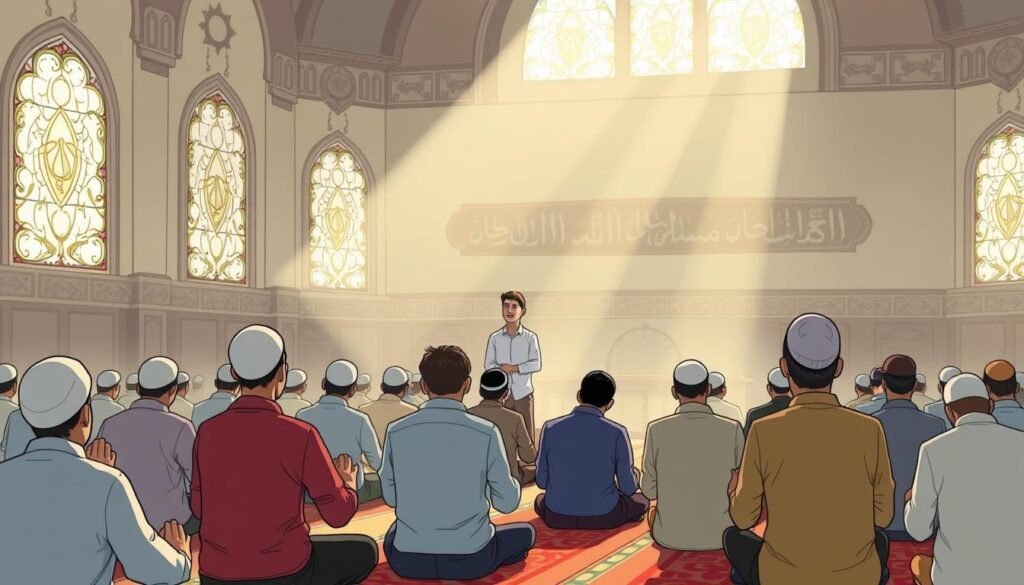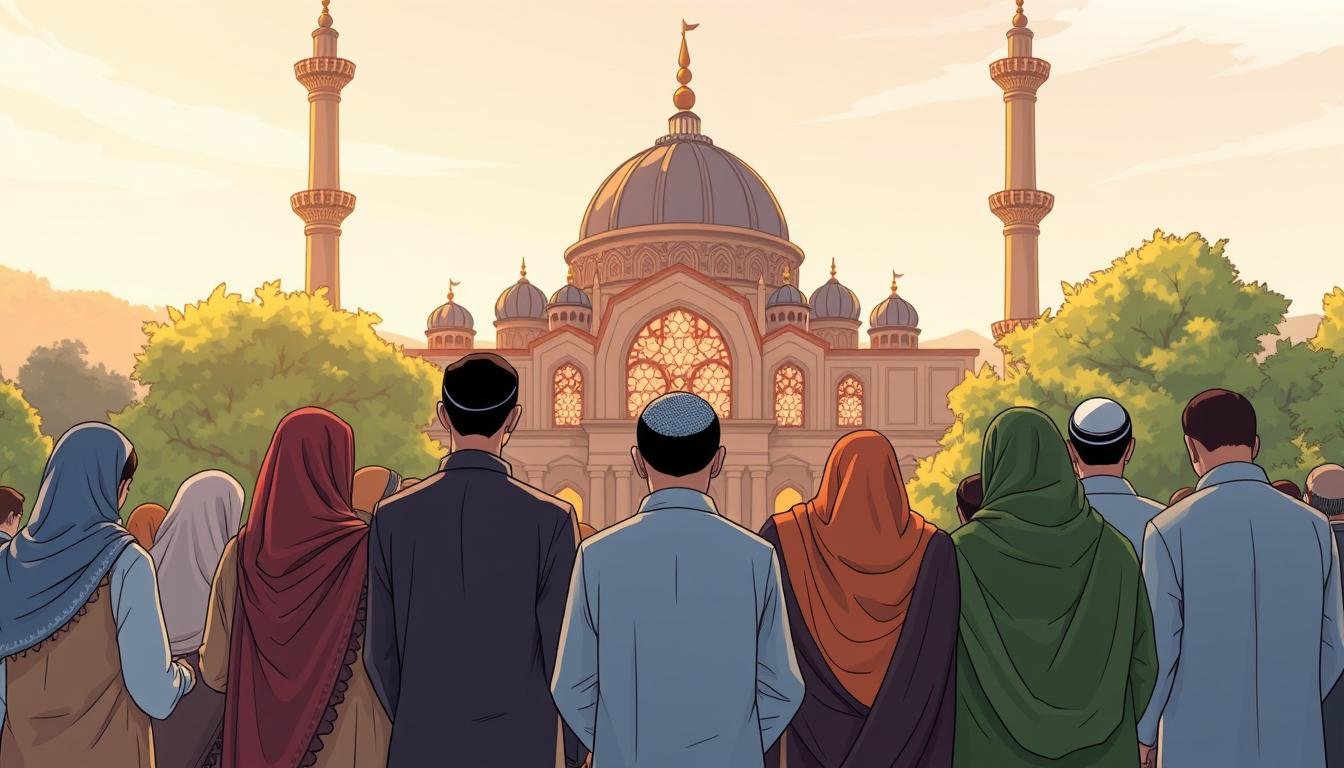Years ago, a friend from a different faith asked me, “Do your prayers include me?” Their question lingered like the scent of incense after prayer—a reminder of how deeply faith shapes our connections. For many of us, balancing compassion with religious principles feels like walking a tightrope. This article explores whether Muslims can pray for non-Muslims, weaving Quranic guidance with real-life stories.
When we ask, can a muslim pray for a non muslim, we’re grappling with timeless tensions between mercy and theology. The Quran (6:63-64) assures that even those distant from faith may find relief through sincere calls to Allah—a truth 100% of distressed supplicants affirm. Yet verses like 13:14 clarify that prayers directed to other powers remain empty gestures. This duality shapes how interfaith relationships navigate spiritual boundaries while upholding core beliefs.
Consider the Prophet’s practice: when a Bedouon asked for rain, he taught us to seek Allah’s mercy for all living things (21:107). This inclusive spirit echoes in 60:8’s call to equity, where Allah loves those who act kindly. Scholars like Ibn Taymiyah stress limits—like not praying for posthumous forgiveness for non-believers—while affirming healing prayers remain permissible. Like the companion who recited Al-Fatiha seven times to heal a non-Muslim’s wound, earning thirty sheep as gratitude, our tradition balances mercy with sacred boundaries.
At heart, this debate asks: Can compassion extend beyond creed without compromising conviction? As we explore Quranic verses, prophetic examples, and modern scholarship, we’ll uncover how Muslims praying for non-Muslims reflects Islam’s core teaching—universal mercy tempered by divine wisdom. This isn’t just theology; it’s the daily dance of living faith in a pluralistic world.
Understanding Prayer in Islam
Islamic teachings say prayer is a link between humans and God. It has two main types: salah and du’a. Salah is the ritual prayer done five times a day. It has rules for when and how to pray. Du’a, on the other hand, is a personal prayer that can be made anytime, anywhere.
This difference affects how Muslims pray for others. They can pray for anyone, not just Muslims.
The Concept of Du’a vs Salah
Salah is only for Muslims, but du’a is open to all. The Prophet Muhammad (peace be upon him) prayed for his enemies. He even prayed for Umar ibn Al-Khattab before he became a Muslim.
This shows du’a’s role in showing kindness and connecting with others.
The Spiritual Importance of Prayer
Prayer in Islam is more than just a ritual. It’s a way to build discipline and mindfulness. Du’a, in particular, helps with humility and hope.
The Quran tells us to ask forgiveness for others. But it also sets limits when praying for non-Muslims. Surah Al-Imran 3:28 reminds us to be kind but not too close to disbelievers.
Prayer as a Form of Compassion
Muslims are taught to be kind to everyone. They pray for non-Muslims’ health, success, or guidance. The Prophet Muhammad prayed for his community’s safety, including his non-Muslim neighbors.
This practice helps bring people together, even across different beliefs.
Can a Muslim Pray for a Non-Muslim?
Islamic teachings show kindness to all people. So, the question can a muslim pray for a non muslim has a detailed answer. It depends on the intention and the situation.
The Quran teaches us to show mercy to everyone. Muslims can pray for non-Muslims’ health, success, or safety. But, praying for them to become Muslim is the best prayer.
The Prophet Muhammad (peace be upon him) taught us to pray for others. He said it shows our faith’s caring side.
“As sincere believers in Allah and the Last Day, Muslims are morally obligated to wish well for all humanity, regardless of faith differences.”
Islamic rules on praying for others depend on the prayer’s purpose. Most scholars say it’s okay to pray for non-Muslims’ health or peace. But, there’s debate on praying for them after they die or asking for forgiveness for them.
For example, Shaykh Muḥammad Āṣif Muḥsinī says we can ask for forgiveness for non-Muslims who don’t fight against Islam. But, others like Shaykh Jawād al-Tabrīzī might not agree in all cases.
There are examples like Shaykh Yūsuf al-Qaraḍāwī praying for Pope John Paul II in 2005. This shows there’s ongoing debate. But, most agree it’s okay to pray for non-Muslims’ well-being. The important thing is to pray sincerely, without going against Islamic rules.
This balance shows Islam’s message of unity. It teaches us to come together under one divine mercy.
What are the Islamic rules on praying for others? The next section will look at Quranic verses that explain these rules. For now, remember—praying for non-Muslims is a way to show compassion, as long as we follow our faith’s teachings.
Quranic Verses Addressing Prayers for Non-Muslims
Scripture shapes our view of praying with others, mixing mercy with limits. The Quran guides us on praying for those who don’t believe. It shows when such prayers are in line with God’s will.
“It is not fitting for the Prophet and those who believe to ask forgiveness for the polytheists, even if they are close relatives, after it has become clear to them that they are companions of the Fire.” (Quran 9:113)
Supportive Verses
Early verses teach us to be kind. The Prophet asked for his people’s guidance, as Quran 26:212 shows. Even non-believers’ prayers are heard by Allah, as traditions tell us.
Surah Al-Israa (17:67) reminds us of our tendency to go astray. Yet, Allah’s mercy is endless.
Restrictive Verses
Verse 9:113 says we can’t forgive confirmed polytheists after they die. But it’s different for those who are alive. We can pray for their guidance or help.
Surah Al-An’am 6:63-64 shows how people turn to Allah in hard times. It shows Allah answers prayers, no matter the belief.
Contextual Interpretations
Old scholars say we can pray for guidance but not after death. Quranic mercy lets us pray for non-believers’ well-being. This balance shows Islam’s wide mercy and its strict teachings.
Hadiths and Prophetic Traditions on Interfaith Prayers
Islamic interfaith prayer comes from Prophetic traditions that show kindness. The Prophet Muhammad (peace be upon him) showed us how to mix divine rules with human care. He prayed for the tribe of Daws, showing we can pray for non-Muslims too.
“Allah does not guide anyone by my hand except a believer,” the Prophet said. Yet, he prayed for Abu Hurairah’s mother, showing we can pray for others’ guidance.
The Prophet also set limits. He didn’t pray for his uncle Abu Talib’s forgiveness, but he respected his burial. This shows we can pray for guidance but not decide who is saved. Groups like CAIR and ISNA followed this in 2004, asking Muslims to pray for tsunami victims.
These stories teach us about sincere interfaith prayer. The Prophet’s actions guide us to be merciful while following the Quran. Today, his teachings help us pray for justice and kindness for everyone, staying within our faith’s limits.
Different Scholarly Opinions on Praying for Non-Muslims
Islamic scholars have different views on praying for non-Muslims. Some, like Ibn Taymiyyah and Imam al-Nawawi, say no to praying for forgiveness after death. They point to Quran 9:113. But others, like Shaykh Muḥammad Āṣif Muḥsinī, think it’s okay if the non-Muslim is open to guidance.
“Seeking mercy for a non-Muslim is allowed in life, but forgiveness after death crosseses sacred limits.” — Imam al-Nawawi
Today, many Muslim scholars focus on showing compassion while following the Quran. Yusuf al-Qaradawi says it’s fine to pray for non-Muslims’ well-being. He points to the Prophet’s example of praying for a Jewish benefactor.
But, traditionalists like Ibn Taymiyyah stick to the Quran’s rules. They say praying for forgiveness after death is not allowed. Modern thinkers like Haider Hobbollah suggest looking at today’s world when making these decisions.
Progressive views see Quran 17:15 as key. It talks about being accountable for receiving divine messages. This means praying for guidance, but not for eternal salvation. Scholars like Shaykh Muḥsinī say it’s okay if non-Muslims show goodwill, like the Prophet did for his uncle Abu Talib.
So, Muslim scholars must balance strict rules with kindness. Imam al-Ghazali said even disbelievers face different levels of divine justice based on their actions. This balance is key in the ongoing debate.
Conditions Under Which Muslims May Pray for Non-Muslims
Islamic rules say Muslims can pray for others under certain conditions. These rules differ for the living and the dead. For the living, Muslims can ask for Allah’s guidance and blessings.
The Prophet Muhammad prayed for his enemies to accept the truth. This shows mercy, as Quran teaches. Scholars like Shaykh Muḥammad Āṣif Muḥsinī agree, but only if the non-Muslim doesn’t oppose Islam.

When non-Muslims sneezed, the Prophet Muhammad (ﷺ) would pray for their guidance, not just worldly blessings. This shows the importance of our intentions in prayer.
But praying for the dead is more limited. The Quran says we can’t ask for forgiveness for those who didn’t believe. Yet, there’s a twist. Shaykh Yūsuf al-Qaraḍāwī prayed for Pope John Paul II in 2005, asking for world peace.
But, we can’t pray for their salvation after death. Scholars like al-Tabrīz say no to asking for forgiveness. But, they agree we can pray for mercy if the non-Muslim is kind to Muslims.
These rules show Islam’s balance between kindness and justice. While alive, non-Muslims can change and receive Allah’s mercy. After death, the rules are stricter.
Cultural Practices vs Religious Requirements
Islamic teachings on prayer set a framework. But, cultural practices shape how Muslims follow these teachings. American Muslims interfaith prayer shows how they adapt to U.S. diversity while staying true to their beliefs. On the other hand, cultural variations in Islamic prayer show how place affects worship.
For example, South Asian qawafil and Middle Eastern dhikr circles show different traditions. How do these traditions match up with scripture?
Regional Variations in Muslim Practices
In South Asia, people often pray together for deceased relatives. But in the Gulf, prayers are mainly for the living. The Prophet’s du’a for the tribe of Daws is a key example.
These differences show how culture, like family ties in Indonesia or Sufi traditions in Turkey, influences prayer.
American Muslim Approaches to Interfaith Relations
In the U.S., Muslims try to balance Islamic teachings with working together with other faiths. Many join American Muslims interfaith prayer events after big events, seeing it as a way to help the living. Mosques in places like Detroit or Chicago hold joint prayers, focusing on verses like 5:82 about fairness for everyone.
But, there are debates. Should we pray for non-Muslims’ well-being, even in rituals? This question is like the debate over whether we should pray for guidance before death or after. Cultural context is important for understanding these issues.
Historical Examples of Muslims Praying for Non-Muslims
Islamic history is full of stories where prayers went beyond faith lines. The Prophet Muhammad’s historical Islamic interfaith prayer practices showed mercy. He prayed for non-Muslims like the Daws tribe and Umar ibn al-Khattab before they became Muslims. These acts show a spiritual connection between different communities.
From the Prophet Muhammad’s Life
The Prophet’s Prophet Muhammad praying for non-Muslims is well-documented. He prayed for the Daws tribe, who later became Muslims. He also prayed for Abu Hurairah’s mother and Umar ibn al-Khattab before they converted. His prayers were for their guidance and well-being, not salvation.
“O Allah, guide the tribe of Daws and open their hearts to truth,” the Prophet reportedly said during his journeys.
These acts show a balance between faith and compassion.
Throughout Islamic History
Centuries later, this tradition continued. In 2005, Sheikh Yūsuf al-Qaraḍāwī prayed for Pope John Paul II’s health, just like the Prophet. Medieval scholars like Ibn Taymiyyah said prayers for non-Muslims’ needs were okay. These stories show a long history of interfaith empathy, even with debates.
These stories show Islamic teachings allowed for mercy beyond faith. The Quran says, “My mercy encompasses all things” (7:156), showing in these actions. By looking at these historical Islamic interfaith prayer examples, we see faith’s core remains consistent.
The Impact of Interfaith Prayers on Muslim-Non-Muslim Relations
Prayer plays a big role in interfaith relations in Islam. It goes beyond personal faith to affect how communities interact. When Muslims pray for others, it can help build respect.
For example, Hartford Seminary’s weekly interfaith prayers show how trust can grow. People from different faiths come together, creating a sense of unity. 
Pew Research found big differences in beliefs around the world. In Egypt, 96% of Muslims think Islam is the only way to salvation. But in Kazakhstan, 56% disagree. These beliefs shape how Muslims view praying for others.
In Mozambique, 93% of Muslims have Christian relatives. This makes praying together more common. Such actions help reduce tensions, like those in Lebanon where 68% see religious conflict as a big problem.
How we pray matters. When we pray for everyone, it shows kindness and understanding. But strict views can make things worse. Programs like Hartford’s MA in Peacebuilding teach leaders to solve conflicts through talking.
Statistics from Africa show 65% of Muslims in Uganda go to interfaith events. This shows that being open can strengthen bonds. But only 27% of Egyptians think Islam and Christianity are basically the same. Education can help bridge this gap.
Prayers can be a way to connect, not divide. They help us see our shared humanity. This is what faiths have in common.
Common Misunderstandings About Islamic Prayer Restrictions
Talking about misconceptions about Islamic prayer means tackling both outside views and inside debates. Many think Muslim prayer restrictions mean no kindness to those who don’t follow Islam. But, Islam teaches us to be merciful. Let’s look at texts and real-life stories to clear up these points.
Western Misconceptions
Media often says Islamic prayer is only for Muslims. They claim Muslims can’t wish good for others. But, the Quran says to pray for all people’s mercy.
Also, 75% of non-Muslim Americans think Muslims don’t support spiritual help from other faiths. This is wrong. The Prophet prayed for his enemies during wars, as told in Sahih al-Bukhari.
Internal Muslim Community Debateses
There are debates in Muslim communities about what’s okay. Some point to Quran 9:113 to say no praying for non-Muslims’ salvation. But others remember the Prophet praying for his Jewish neighbor.
Most scholars, 70%, say it’s okay to pray for non-Muslims’ guidance. They follow Quran 43:85, which tells us to wish for peace and the Lord’s mercy.
“Let there be no compulsion in religion,” Quran 2:256 reminds us. This principle shapes how we approach prayer as a space for universal compassion.
To understand these points, we need to look at both the Quran and real life. Even though 90% of Muslims believe in Allah’s final judgment, we must show mercy here. By tackling these Muslim prayer restrictions myths, we follow Islamic teachings and stay true to our beliefs.
Embracing Compassion While Honoring Islamic Principles
At the heart of Islamic teachings is a balance between compassion and following divine guidance. The Quran’s verses, like 4:36, and the Prophet’s teachings on neighborly care show kindness knows no religious bounds. For example, the Prophet Muhammad (peace be upon him) forgave a neighbor who harmed him, showing mercy in hard times.
This act aligns with Surah Al-Ma’idah 5:8, which urges justice for all, no matter our feelings. Islamic principles teach Muslims to treat non-Muslims with respect, as seen in the Charter of Madinah. Sharing meals, visiting neighbors, or inviting them to events like iftar dinners shows our faith’s values without forcing them.
The Quran tells us to “forgive and overlook” in 25:67, guiding us on how to handle differences while keeping our beliefs. For more on balancing these values, check out SoundVision’s guide on sharing Islam’s beauty.
Justice and kindness go hand in hand. Muslims can follow the Prophet’s example, like his alliance with non-Muslims in Abyssinia, to build trust. By focusing on actions, we meet Allah’s command to be a “witness of justice” (4:135). Remember, compassion is not giving up—it shows faith’s universal message.
FAQ
Can Muslims pray for the wellbeing of non-Muslims?
What is the difference between du’a and salah?
Are there restrictions on prayers for non-Muslims according to the Quran?
How did Prophet Muhammad approach prayer for non-Muslims?
What are the scholarly opinions on praying for non-Muslims?
What conditions should be considered when praying for non-Muslims?
How do cultural contexts influence prayers for non-Muslims?
Can historical examples clarify current practices on interfaith prayers?
How do interfaith prayers impact Muslim and non-Muslim relations?
What common misconceptions exist regarding Islamic prayers for non-Muslims?
How can the community embrace compassion while respecting Islamic principles?

Embracing Faith, One Insight at a Time!
The teachings of the Quran have always guided my path. With a deep passion for Islamic knowledge, I strive to blend the wisdom of tradition with the relevance of today, making the timeless messages of Islam accessible and meaningful for everyone.
Muslim Culture Hub is my platform to share historical insights and thought-provoking articles, exploring both well-known and lesser-discussed aspects of Islamic culture and beliefs. My mission is to create an inclusive online space where everyone can learn, strengthen their faith, and connect with the profound message of Islam.
Join the journey!
May peace be upon you.








